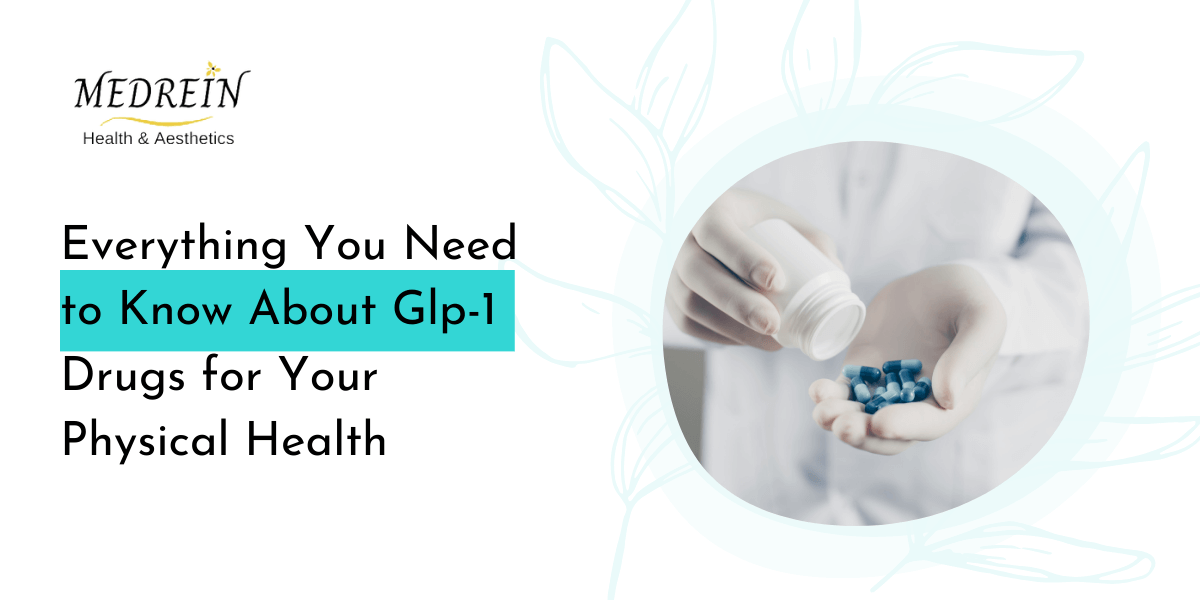The glucagon-like peptide 1 (GLP-1) agonist is a diabetes medication that surpasses the usual blood sugar control benefits and offers the possibility of shedding extra pounds. These drugs have gained recognition for increasing insulin sensitivity and glucose metabolism, facilitating weight loss. Keep reading to learn more about these GLP-1 drugs.
What Are GLP-1 Agonists?
GLP-1 agonists are classes of diabetes medications that help regulate blood glucose levels in patients with type 2 diabetes. Besides, these drugs can also help treat obesity. The GLP-1 drugs are injectable medications that will be injected into the fatty tissue under your skin. These injections can be given in your outer thighs, upper buttocks, belly, and the backs of your arms. GLP1- agonists are also known as GLP-1 receptor agonists, GLP-1 analogs, and incretin mimetics.
How Do GLP-1 Agonists Work?
GLP-1 is a hormone that your small intestine makes to regulate blood glucose levels. GLP-1 medications mimic this hormone, enabling the same action as the naturally occurring substance.
GLP-1 work by:
- Triggering Insulin Release From Your Pancreas – Insulin is a hormone that allows your body to use food as energy. Without enough insulin, your blood sugar increases, resulting in diabetes.
- Blocking Glucagon Secretion – The glucagon hormone is used by your body to increase blood sugar levels when necessary. So, GLP-1 drugs prevent more glucose from entering your bloodstream.
- Slowing Stomach Emptying – These drugs slow down digestion, meaning your body releases less sugar from the food you eat into your bloodstream. It helps to keep your blood sugar levels in check while helping you stay full for longer periods.
- Decreasing Your Hunger – GLP-1 affects areas of your brain that process hunger and satiety (how full you feel after eating). It keeps your cravings less, facilitating weight loss.
In this way, the GLP-1 drug helps manage your blood sugar level while reducing your food intake, hunger, and appetite to maintain weight.
What Conditions Are GLP-1 Drugs Used to Treat?
Healthcare providers usually recommend GLP-1 drugs for two conditions, including:
Type 2 Diabetes
Your practitioner may recommend a GLP-1 drug if:
- Oral diabetes medicines don’t work, or you cannot take them due to contra-indications.
- You have a higher A1C (percentage of blood sugar for the last three months) level than your target.
- Despite three months of treatment, you have not attained your target A1C level and have conditions such as heart failure, chronic kidney disease, and atherosclerosis.
Obesity
Doctors recommend GLP-1 agonists, such as high-dose liraglutide and semaglutide, for people with obesity (in which the body mass index (BMI) of a person is 30 or higher) or overweight (in which the BMI of a person is 25-29.9) issues with other health conditions.
Whether it is obesity or type 2 diabetes, simple lifestyle modifications or other surgeries may be recommended to achieve the desired results. These may include:
- Dietary changes
- Medications
- Exercises
- Bariatric (weight loss) surgery
- Behavior modification programs
Are There Different Types of GLP-1 Drugs?
GLP-1 drugs are available in different types, including;
- Liraglutide (Victoza, Saxenda)
- Semaglutide (Ozempic, Wegovy)
- Lixisenatide (Lyxumia)
- Dulaglutide (Trulicity)
- Exenatide (Bydureon)
- Albiglutide (Tanzeum)
What Are the Benefits of Using GLP-1 Drugs?
Besides regulating your blood sugar levels and helping you lose weight, GLP-1 agonists provide substantial benefits, including:
- Lowering blood pressure
- Delaying the progression of diabetes-related nephropathy
- Improving fatty liver disease and lipid disorders
- Reducing your risk of kidney disease and heart disease
Who Can Benefit from GLP-1?
The ideal candidates for GLP-1 medications are those:
- With type 2 diabetes
- Who have obesity or overweight issues
What Are the Potential Side Effects of GLP-1 Drugs?
You may experience the following common side effects when you start the medication or if you take an increased dose:
- Diarrhea
- Loss of appetite
- Vomiting
- Nausea
Other side effects include:
- Mild tachycardia (increased heart rate)
- Headaches
- Indigestion
- Infections
- Dizziness
- Temporary mild itchiness or redness at the injection site
Severe but rare side effects may include:
- Worsening diabetes-related retinopathy
- Medullary thyroid cancer
- Acute kidney injury
- Pancreatitis
Besides these side effects, GLP-1 drugs have a few risks/complications, including low blood sugar (hypoglycemia) and allergic reactions.
Final Thoughts
GLP-1 medications have become a game-changer in diabetes management and weight reduction. With their substantial benefits and unique mechanism of action, including stimulating insulin secretion, suppressing glucagon release, and promoting satiety, GLP-1 agonists remain an effective and promising alternative to traditional diabetes and weight loss treatment.
Get Your Dream Physique with Our GLP-1 Agonists in Southlake, TX
At Medrein Health and Aesthetics, we provide personalized non-surgical weight loss management near you in Southlake, TX. Our aesthetician, Dr. Mikki, will combine GLP-1 drugs with appropriate diet, exercise, and lifestyle modifications to ensure the best results that can address your weight loss goals. Contact us today if you are looking for the best industry-standard GLP-1 injection in Southlake, TX.


